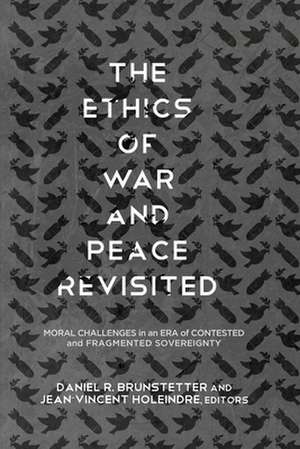THE ETHICS OF WAR AND PEACE REVISITED
en Limba Engleză Paperback – feb 2018
How do we frame decisions to use-or not use-military force? Who should do the killing? Do we need new paradigms to guide the use of force? And what does "victory" mean in contemporary conflict? In many ways, these are timeless questions. But they should be asked again in light of changing circumstances in the twenty-first century. The post-Cold War, post-9/11 world is one of contested and fragmented sovereignty. Contested because the norm of territorial integrity has shed some of its absolute nature. Fragmented because some states do not control all of their territory and cannot defeat violent groups operating within their borders. Humanitarian intervention, preventive war, and just war are all framing mechanisms aimed at convincing domestic and international audiences to go to war (or not), as well as to decide who is justified in legally and ethically killing. The international group of scholars assembled for this book critically examine these frameworks to ask if they are flawed, and if so, how they can be improved. Finally, the volume contemplates what all the killing and dying is for if victory may prove, ultimately, to be elusive.
| Toate formatele și edițiile | Preț | Express |
|---|---|---|
| Paperback (1) | 466.87 lei 6-8 săpt. | |
| Georgetown University Press – feb 2018 | 466.87 lei 6-8 săpt. | |
| Hardback (1) | 994.08 lei 6-8 săpt. | |
| Georgetown University Press – 9 mar 2018 | 994.08 lei 6-8 săpt. |
Preț: 466.87 lei
Nou
89.34€ • 93.51$ • 74.36£
Carte tipărită la comandă
Livrare economică 31 martie-14 aprilie
Specificații
ISBN-10: 1626165076
Pagini: 336
Dimensiuni: 152 x 229 x 26 mm
Greutate: 0.45 kg
Editura: Georgetown University Press
Textul de pe ultima copertă
Lethal force is a necessary, albeit tragic, feature of statecraft. Ethical frameworks help us think methodically about when war is justified, when it is not, how war should be conducted, and what makes for a just and lasting peace. These frameworks may also be misused to persuade domestic and international audiences about the case for war. The contributors to this volume critically reexamine traditional ways of thinking about the ethics of war and peace in light of the changing but contested norm of national sovereignty. Transnational militants, global counterterrorism strikes, and failing states that become regional and humanitarian disasters challenge traditional notions of sovereignty and borders. Failed military interventions and the elusive meaning of victory in modern wars call into question the moral imperatives of just war and the Responsibility to Protect. This book sets a new standard for ethical inquiry into critical debates about war and peace.
